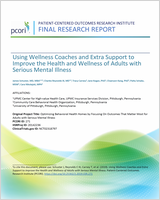
Using Wellness Coaches and Extra Support to Improve the Health and Wellness of Adults with Serious Mental Illness [Internet].
Schuster J, Reynolds C III, Carney T, et al.
Washington (DC): Patient-Centered Outcomes Research Institute (PCORI); 2019 Feb.
Copyright © 2019. UPMC Center for High-Value Health Care. All Rights Reserved.
This book is distributed under the terms of the Creative Commons Attribution-NonCommercial-NoDerivs License which permits noncommercial use and distribution provided the original author(s) and source are credited. (See https://creativecommons.org/licenses/by-nc-nd/4.0/
NCBI Bookshelf. A service of the National Library of Medicine, National Institutes of Health.